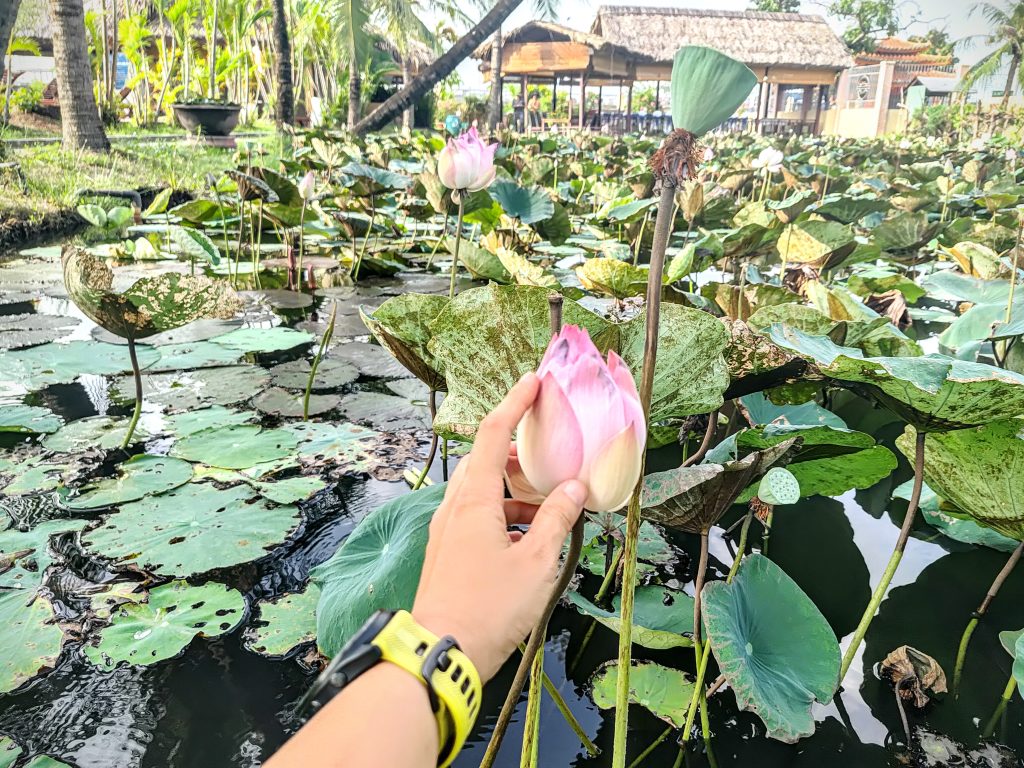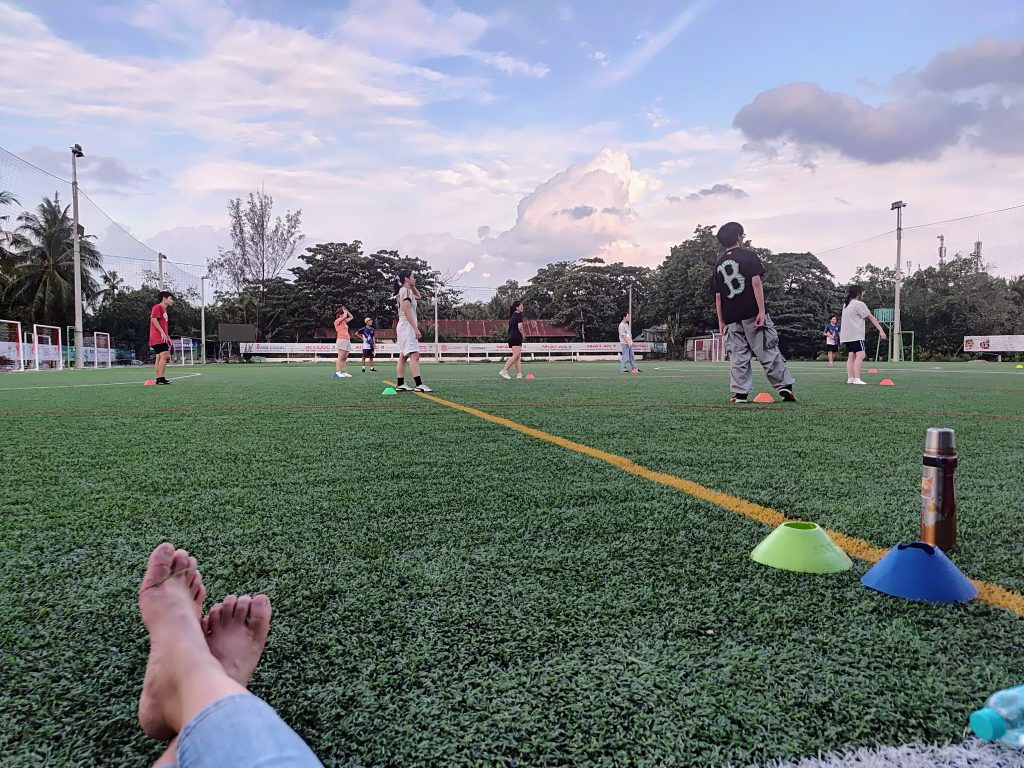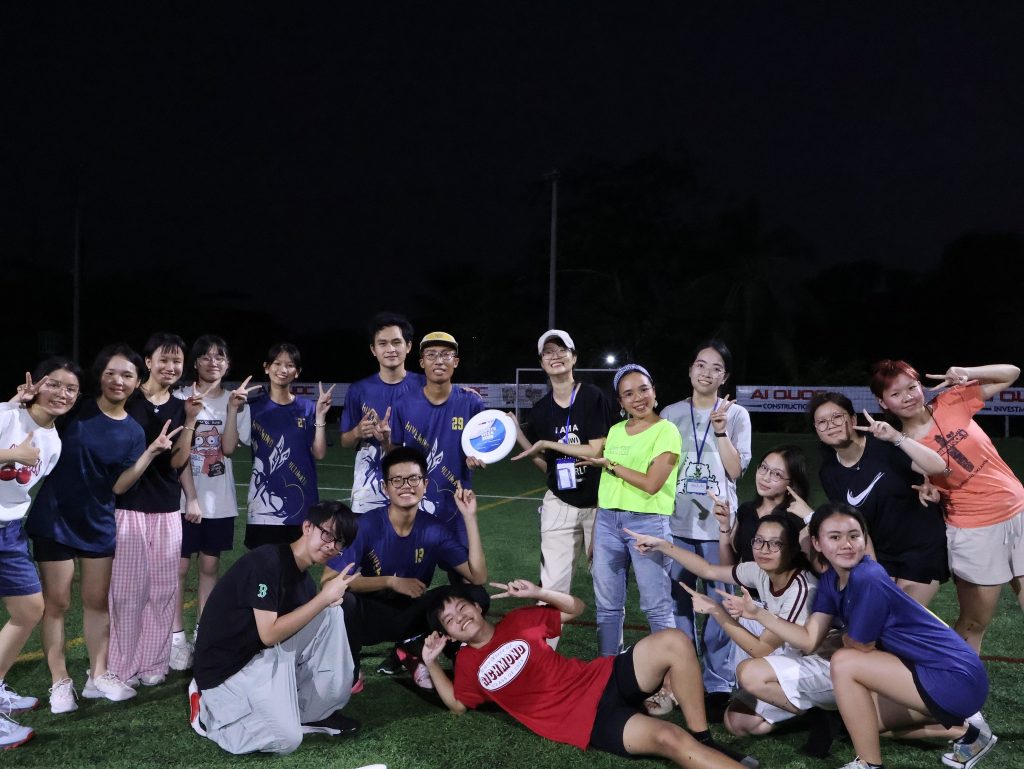The universe works in mysterious ways. Sometimes, in the quietest moments, it grants us exactly what we once longed for—without even asking.
Just yesterday, I found myself immersed in a scene I had silently wished for many mornings before. While commuting to work, I often passed by a small lotus lake. As the seasons changed, the petals wilted and the leaves browned, but the quiet elegance of the lotus remained. I’d think to myself, “How nice would it be to sit beside a lotus lake, touch the petals, and soak in the stillness?”
That wish came true at the Study Abroad Launchpad Academy (SALA), co-organised by UWC Vietnam and the Open Road Foundation, a launch program to support students preparing to study abroad. As I entered the venue—a charming, serene resort just 30 minutes from the city—I stood still for a moment. There it was: a lotus lake, calm and radiant, in full bloom. I sat by the edge, brushed my fingertips against the soft petals, and breathed deeply. That moment of peace reminded me just how magical life can be when we stay open to it.
But the real beauty of the day unfolded inside, where I met dozens of bright-eyed students about to embark on their first international journey.

Mentoring the Next Generation of Global Citizens
Walking into the event space, I was instantly surrounded by curiosity, energy, and youthful ambition. These students were preparing to leave Vietnam and study abroad—some in the U.S., some in Europe, others in Japan or Korea. The nervous excitement in the room felt deeply familiar. I, too, had been in their shoes once.
Many of them approached me with thoughtful questions:
“How do I manage stress when studying abroad?”
“What do I pack?”
“How do I handle failure or subjects that are too difficult?”
“How can I prove myself in a foreign environment?”
Their questions took me back to the days before my own departure years ago—when I didn’t know what to bring, how to emotionally prepare, or who to ask for help. Back then, I had very few people I could turn to. That’s why being there, sharing what I’ve learned through trial and error, felt like a full-circle moment.
Practical Advice for First-Time Study Abroad Students
I began with the basics—packing tips, things to bring from Vietnam that are hard to find abroad, and suggestions for handling culture shock. The students took notes eagerly, some even asking follow-up questions about dorm life, social integration, and choosing courses.
One of the most critical parts of our discussion was mental health.
We often focus on the exciting parts of studying abroad—new countries, new people, new experiences—but we don’t always talk about the emotional rollercoaster that comes with it. As someone who has experienced it and witnessed others suffer in silence, I felt it was my duty to share openly.

Stress Management and Mental Health Abroad
When you’re far from home, managing your mental health can be one of the hardest things to do—especially when you don’t even know you’re struggling.
Some students asked, “How do I know if I’m stressed or just homesick?” That question struck me because many students confuse the two, or worse, ignore the signs altogether.
I told them:
Stress doesn’t always look like crying or panicking. Sometimes, it’s irritability. Sometimes, it’s binge eating. Sometimes, it’s feeling nothing at all.
These are red flags that shouldn’t be overlooked.
I emphasized that having a mental health toolbox is crucial. I shared some practices that helped me over the years:
-
Daily walks or runs to release built-up anxiety
-
Journaling to process thoughts and gain clarity
-
Talking to a friend or counselor instead of bottling things up
-
Physical movement—whether it’s yoga, dance, or even just stretching
-
Meditation or breathing exercises for emotional regulation
These may sound simple, but for a young person navigating the unfamiliar, these tools can be lifesaving.
Some nodded in agreement. Others scribbled in their notebooks. A few looked surprised—like they’d never considered their emotions as something to proactively manage.
And that’s the problem. We wait until we break down to seek help. But emotional well-being should be preventive, not reactive.

The Unspoken Crisis: When Students Don’t Cope
I shared a story that was hard to tell, but necessary.
I know of a few young people—acquaintances, not close friends—who couldn’t adapt abroad. Within just a few months, the stress, isolation, and academic pressure became too much. Tragically, some of them took their own lives.
It’s devastating. And it’s real.
This is why events like the laundpad event matter so much. They don’t just prepare students with checklists and visa requirements. They create space for open conversations—about mental health, vulnerability, and self-care.
I could see it in the students’ faces: this was a topic they didn’t often get to talk about, but one they deeply needed to.

The Role of Community and Mentorship
Looking back on my own journey, I realize how essential community is—especially in the first year abroad. You need someone to lean on. You need someone who understands, who’s been there, who can reassure you that it’s normal to feel lost sometimes.
That’s what I hope I offered during the event—a voice of experience, a reminder that it’s okay to ask for help, and an invitation to stay grounded through every high and low.
Many students came up to me afterward just to say thank you. One said, “I’ve never thought about mental health this way before.” Another said, “I feel more prepared now.”
Those words made everything worth it.
Manifesting Peace and Purpose
As I drove back from the event, I reflected on the lotus lake again.
That peaceful moment by the water was more than a coincidence. It was a manifestation of a quiet wish, a reminder that when you align your life with purpose—serving others, sharing your story, lifting the next generation—the universe meets you halfway.
I used to wish for mentors and guidance. Now, I get to be that for others.
Final Thoughts: Advice for Students Going Abroad
If you’re reading this and preparing to study abroad, here are five reminders:
-
Prepare your mind, not just your luggage. Mental strength is as important as any passport or plane ticket.
-
Find your anchor. Whether it’s journaling, exercise, or a trusted friend—identify what grounds you.
-
Ask for help early. Don’t wait until you hit a crisis. Seek support at the first sign of stress.
-
Embrace both struggle and growth. They often come together.
-
Give back when you can. Share your story with others. One day, you’ll be someone’s lifeline.

